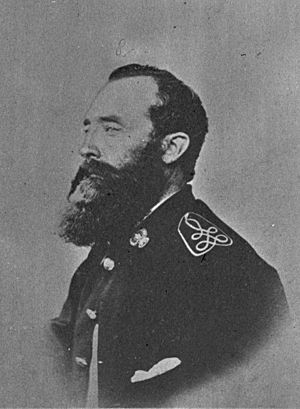Frederick Pottinger facts for kids
Quick facts for kids
Sir Frederick Pottinger
|
|
|---|---|

Official portrait of Frederick Pottinger
|
|
| Born | April 27, 1831 |
| Died | April 9, 1865 |
| Title | 2nd Baronet Pottinger |
Sir Frederick William Pottinger, 2nd Baronet (1831–1865), was a police inspector known for his work in New South Wales, Australia. He became famous for leading the police in their hunt for well-known bushrangers like Ben Hall, John Gilbert, Frank Gardiner, and John Dunn. A Baronet is a special title, like a knight, that can be passed down in a family.
Contents
Early Life and Family Background
Frederick Pottinger was born in India on April 27, 1831. His father was Sir Henry Pottinger, a high-ranking officer in the East India Company, which was a powerful British trading company. Henry Pottinger later became the first Governor of Hong Kong. Frederick went to a famous school in England called Eton College from 1844 to 1847.
Between 1850 and 1854, Frederick was an officer in the Grenadier Guards, a famous army group in England. During this time, he lost a lot of his family's money. In 1856, he took over his father's title, becoming the 2nd Baronet. However, he soon lost all his remaining money and owed many people.
Joining the Police Force
To start fresh, Frederick Pottinger moved to Australia hoping to find gold. Instead, he joined the New South Wales police force as a mounted trooper, which meant he rode a horse. He was an excellent horse rider. For several years, he worked on the gold escort, protecting gold as it was moved between Gundagai and Goulburn.
Pottinger kept his special title a secret at first. But in 1860, the head of the police, John McLerie, found out. Because of his background, Pottinger quickly received better jobs. In November 1860, he became a clerk in Dubbo. Then, on October 1, 1861, he became an assistant superintendent for the Southern Mounted Police Patrol. He wanted to do well in his new role.
However, Pottinger sometimes got into trouble. In December 1861, he was involved in a fight in Young and was warned about his behavior. He was then sent to the Lachlan River area. There, he became known as a very active but often unlucky hunter of bushrangers.
Hunting Bushrangers
In 1862, Pottinger was made an inspector of police for the Western District of New South Wales. In April 1862, he arrested Ben Hall in Forbes for robbery. However, Hall was released because there wasn't enough proof. Soon after, Ben Hall joined Frank Gardiner's gang.
On June 15, 1862, Gardiner's gang robbed the Lachlan gold escort, stealing about £14,000. This was Australia's biggest gold robbery at the time. Pottinger managed to capture two of the bushrangers quickly. But they escaped a few days later during a gun battle. Pottinger did manage to get back some of the stolen gold.
Challenges and Public Opinion
Many people thought Pottinger made mistakes. He was criticized for not having enough police guards on the gold escort and for letting his prisoners escape. One night in August, Pottinger and his police group surrounded a house where Gardiner was hiding. The bushranger escaped when Pottinger's pistol accidentally fired.
Pottinger also faced other problems. In February 1862, he was in court in Yass for hitting someone with a billiard cue during a game. In February 1863, while in Sydney for a trial, he was pushed by people in the street. He also threatened a Member of Parliament, J. J. Harpur, with his whip because he didn't like what Harpur had said about him.
Losing His Job and Final Days
The bushrangers in Pottinger's area became more active. He did manage to capture Patrick Daley. On August 17, 1864, he almost caught James Alpin McPherson.
In May 1863, the head of the police asked for new ideas to catch the bushrangers. In January 1865, Pottinger rode a horse in the Wowingragong races. This was against the rules for police officers. Because of this, he lost his job on February 16, 1865. Pottinger said he was trying to trick Ben Hall and John Dunn into showing themselves at the races, and his plan worked, but he didn't see them.
Many people on the goldfields and in towns were upset about him losing his job. They held meetings and signed papers asking for him to get his job back, as they saw him as a brave and hardworking policeman. Pottinger went to Sydney to try and get his job back.
On March 5, 1865, while trying to get onto a moving coach in the Blue Mountains, Pottinger accidentally shot himself in the stomach. He was taken to the Victoria Club in Sydney, where he died on April 9, 1865. His brother Henry became the 3rd Baronet. Frederick Pottinger was buried at St Jude's Anglican Church in Randwick.
Images for kids
 | Bessie Coleman |
 | Spann Watson |
 | Jill E. Brown |
 | Sherman W. White |


